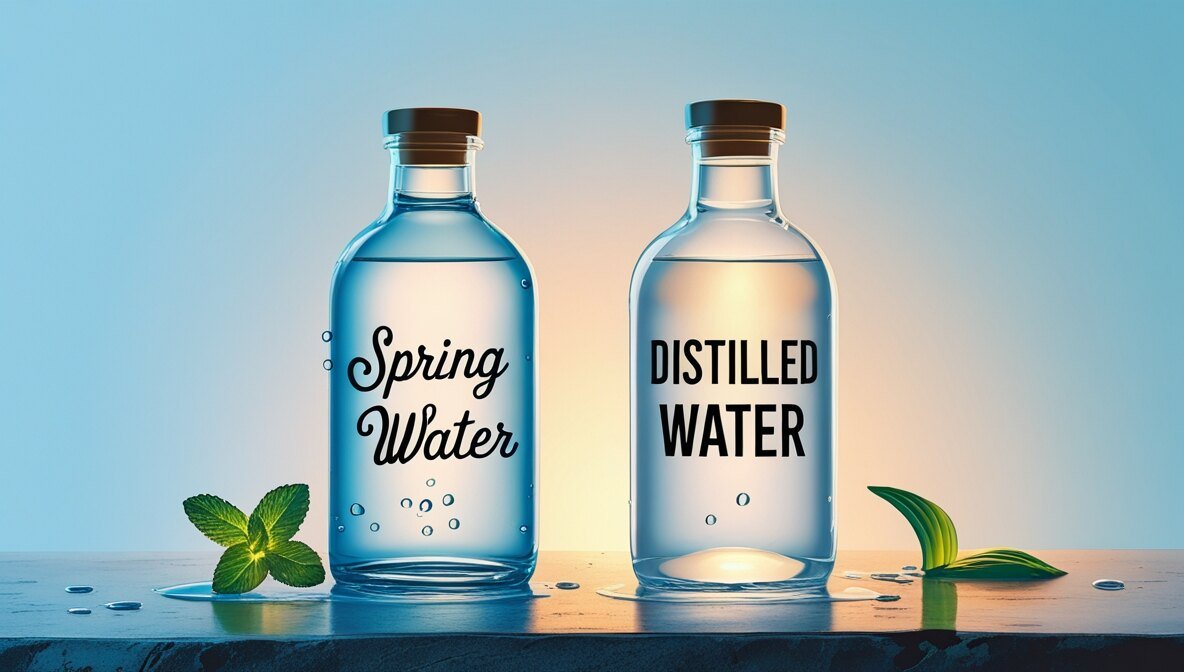When it comes to choosing the right type of water, the debate between distilled vs. spring water is a common one. While both are safe to drink, they have distinct differences in purity, mineral content, and processing methods.
The difference between spring water and distilled water lies in how they are sourced and treated. Spring water comes from natural underground sources and contains essential minerals, while distilled water undergoes a purification process that removes all impurities, including minerals.
Understanding the benefits of spring vs. distilled water is crucial when deciding which one to use for drinking, cooking, or medical purposes. In this article, we’ll compare their sources, purification processes, health benefits, and best uses to help you make an informed choice.

What Is Distilled Water?
Distilled water is a type of purified water that has undergone a distillation process to remove impurities, minerals, and contaminants. This process ensures that the water is free from bacteria, chemicals, and dissolved solids, making it one of the purest forms of water available.
The Distillation Process
The distillation process involves:
- Boiling the water until it turns into steam.
- Capturing the steam in a separate chamber.
- Condensing the steam back into liquid form, leaving behind impurities.
Since minerals and contaminants do not evaporate with the water, the result is pure H₂O without any additional substances.
What Does Distillation Remove?
- Heavy metals (lead, mercury, arsenic)
- Bacteria and viruses
- Chlorine and other chemicals
- Dissolved salts and minerals
Common Uses of Distilled Water
Because of its high purity, distilled water is used in various applications:
- Drinking water (preferred by some for its purity).
- Medical use (in hospitals, laboratories, and for CPAP machines).
- Industrial purposes (used in car batteries, steam irons, and manufacturing).
- Cosmetic and skincare products (found in shampoos, lotions, and beauty products).
While distilled water is free from contaminants, it also lacks essential minerals, which is a key factor in the debate between spring vs. distilled water.
What Is Spring Water?
Spring water is naturally sourced from underground aquifers that flow to the surface, often collected at natural springs or through wells. Unlike distilled water, spring water retains essential minerals, making it a popular choice for drinking due to its refreshing taste and potential health benefits.
Natural Sourcing of Spring Water
Spring water originates from deep underground sources, where it is naturally filtered through layers of rock, sand, and soil. This natural process helps remove many contaminants while preserving beneficial minerals. Because of its origin, spring water is often considered clean and pure before additional processing.
Essential Minerals in Spring Water
One of the biggest advantages of spring vs. distilled water is its mineral content. Spring water typically contains:
- Calcium – Supports bone health and muscle function.
- Magnesium – Helps with nerve function, heart health, and energy production.
- Potassium – Regulates hydration and muscle contractions.
These naturally occurring minerals enhance the taste of spring water while also contributing to hydration and overall well-being.
Filtration and Purification Before Consumption
Even though spring water is naturally filtered, bottled spring water undergoes additional purification to meet safety standards. The process may include:
- Carbon filtration – Removes chlorine, odors, and organic impurities.
- UV light treatment – Kills bacteria and viruses without altering mineral content.
- Microfiltration – Further removes fine particles while keeping beneficial minerals intact.
Unlike distilled vs. spring water, where distillation removes all minerals, spring water is typically purified while preserving its natural composition, making it a preferred choice for hydration and daily consumption.

Key Differences Between Distilled Water and Spring Water
Understanding the difference between spring water and distilled water is essential when choosing the best option for drinking, cooking, or other uses. Below are the main differences between these two types of water:
| Feature | Distilled Water 💧 | Spring Water ⛲ |
| Source | Boiled and condensed from any water source | Naturally sourced from underground springs |
| Purification Process | Distillation removes all contaminants and minerals | Naturally filtered and purified before bottling |
| Mineral Content | No minerals; pure H₂O | Contains essential minerals like calcium, magnesium, and potassium |
| Taste | Flat or bland due to lack of minerals | Fresh and crisp due to natural minerals |
| Health Benefits | Pure but lacks beneficial minerals | Provides hydration with added minerals for overall well-being |
| Common Uses | Medical, laboratory, and industrial applications | Preferred for drinking and hydration |
| Shelf Life | Long shelf life but can absorb contaminants if exposed to air | Fresh but best consumed within a certain period |
| Best For | Medical devices, humidifiers, and certain diets requiring pure water | Everyday drinking, cooking, and general hydration |
Health Benefits & Risks of Distilled Water vs. Spring Water
✅ Health Benefits:
- Naturally rich in essential minerals like calcium, magnesium, and potassium, which support hydration and bodily functions.
- Provides a refreshing taste due to its mineral content, making it a preferred choice for drinking.
- Can help support bone health, heart function, and muscle activity due to the presence of beneficial nutrients.
⚠️ Health Risks:
- May contain natural contaminants if not properly filtered, including bacteria, heavy metals, or organic compounds.
- Some bottled spring water brands lack strict regulations, so it’s essential to choose reputable sources.
- If sourced from polluted environments, spring water may require additional purification before consumption.
Which Water is Healthier? Distilled Water vs. Spring Water
When comparing distilled water vs. spring water, the healthier option depends on your specific needs and usage.
✅ For everyday hydration, spring water is generally the better choice because it contains natural minerals like calcium, magnesium, and potassium. These nutrients support bone health, muscle function, and electrolyte balance, making it a great option for regular drinking.
✅ For medical or specialized uses, distilled water is safer due to its purity and lack of contaminants. It is commonly used in medical devices, laboratories, and certain dietary needs where minerals or impurities could interfere with treatments.
⚠️ If choosing distilled water for drinking, it’s important to supplement with mineral-rich foods or use electrolyte drops to restore essential nutrients. Since distilled water lacks naturally occurring minerals, long-term consumption without supplementation may lead to deficiencies.
Ultimately, spring vs. distilled water depends on whether you prioritize mineral benefits or ultra-pure water. For most people, spring water is the healthier option, while distilled water is ideal for specific medical or industrial purposes.
Conclusion: Choosing the Right Water for Your Needs
Understanding the difference between spring water and distilled water helps in making an informed choice based on health needs and intended use. Distilled water is completely purified and free from minerals, making it ideal for medical, industrial, and laboratory purposes. However, it lacks essential nutrients needed for hydration.
On the other hand, spring water contains natural minerals like calcium, magnesium, and potassium, making it the better choice for daily drinking and hydration. Its refreshing taste and nutritional value make it a preferred option for most people.
Before choosing spring vs. distilled water, consider taste, mineral content, and usage. If you need pure, contaminant-free water, distilled water is best. For regular hydration with added health benefits, spring water is the superior option. Make an informed choice based on your specific needs!
Can you drink distilled water daily?
Yes, you can drink distilled water daily, but it lacks essential minerals like calcium and magnesium. If consumed regularly, it’s recommended to supplement with mineral-rich foods or electrolyte drops to maintain a proper mineral balance.
Is spring water healthier than distilled water?
Yes, spring water is generally healthier for daily consumption because it contains natural minerals that support hydration and overall well-being. Distilled water is pure but lacks essential nutrients, making spring water the better choice for most people.
Does distilled water remove toxins from the body?
Distilled water does not actively remove toxins, but its purity ensures that you’re not consuming additional contaminants. However, since it lacks minerals, it doesn’t aid in replenishing electrolytes lost through sweating or bodily functions.
Which water is better for pets—spring or distilled?
Spring water is better for pets because it contains natural minerals that support hydration and health. Distilled water is safe, but since it lacks minerals, it may not be the best long-term option unless your pet’s diet provides sufficient nutrients.
Does distilled water cause mineral deficiencies?
Drinking only distilled water for an extended period without getting minerals from food or supplements may contribute to deficiencies. Since distilled water removes all minerals, it’s important to maintain a balanced diet or add electrolyte drops if drinking it regularly.
Is boiled water distilled water?
No, boiled water is not the same as distilled water. Boiling kills bacteria and viruses, making it safer to drink, but it does not remove minerals, heavy metals, or chemicals. Distilled water, on the other hand, goes through evaporation and condensation, leaving behind all impurities, including minerals.
Can I make distilled water at home?
Yes, you can make distilled water at home by boiling water and collecting the steam in a separate container. The steam condenses back into liquid form, leaving behind impurities and minerals. This simple distillation process ensures pure water, similar to commercially distilled water.

Anamika is a passionate writer for Eco365Store.com, specializing in topics that inspire a cleaner, greener world. With expertise in home cleaning, recycling, and eco-friendly solutions, she crafts engaging and informative articles that help readers adopt sustainable practices in their daily lives.

